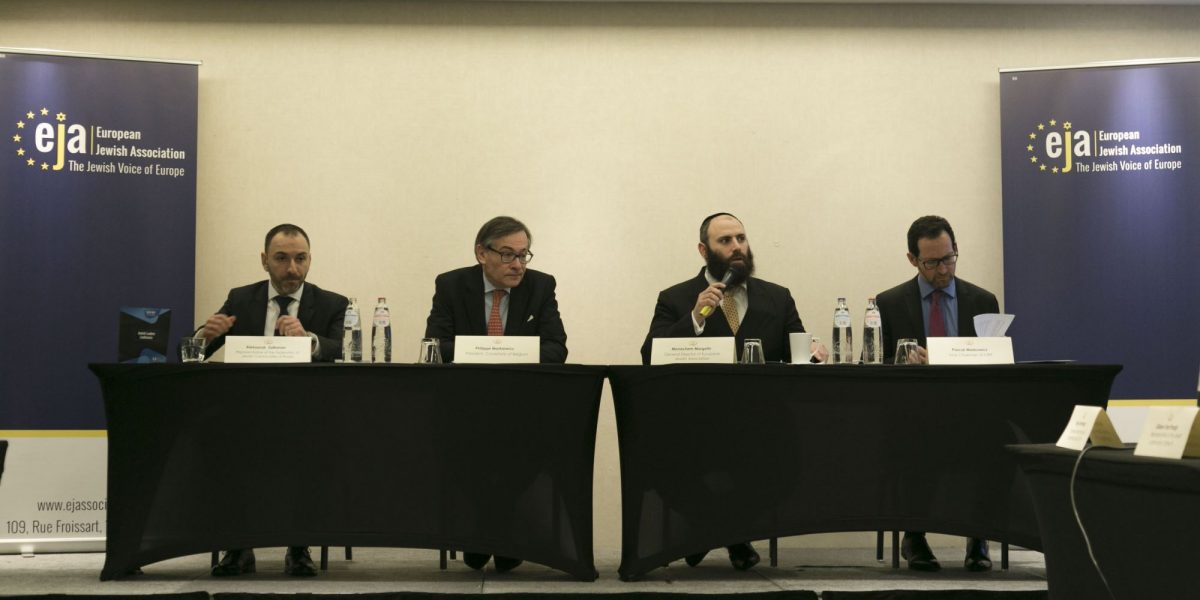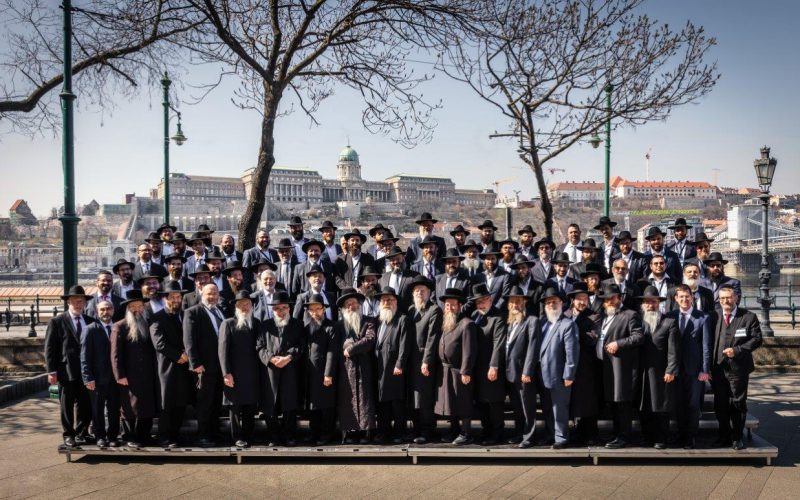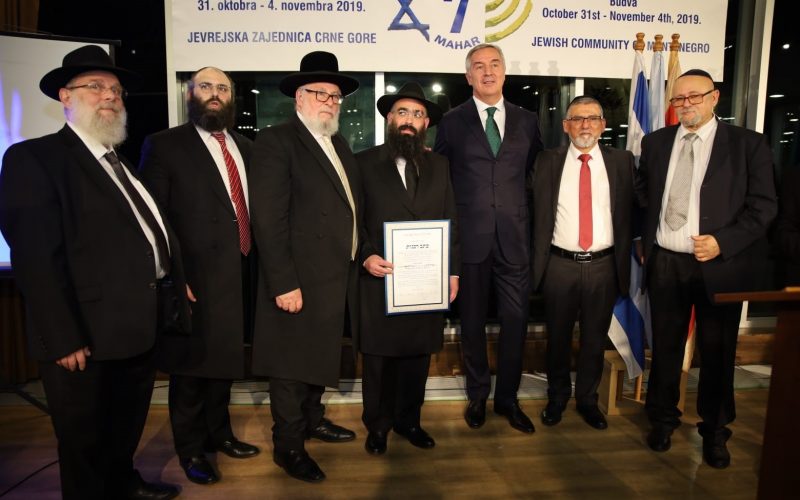60 Jewish Organizations Leaders Participate in the EJA Conference

Sixty European Jewish organization leaders congregated on the 23.1.17 in Brussels, for the first conference of its kind. The European Jewish Association (EJA) established the opportunity for Rabbis and Jewish community leaders to meet each other, share experiences and realize how common their issues are. The participants exchanged updates on security and anti-Semitic incidents that have intensified in Europe.
Honored participants were Holly Huffnagle, Policy Advisor to the Special Envoy to Monitor and Combat Antisemitism at the U.S. Department of State for the Trump government, who reported that the American State Department is constantly on track of Antisemitism throughout the world, and Katharina von Schnurbein Coordinator of the European Commission to fight anti-Semitism, who represents a contact point for anyone experiencing anti-Semitic attack. Her department plans to develop strategies on combating anti-Semitism in Europe. Nitsana Darshan-Leitner spoke about using legislative tools to reveal and dispute Antisemitism.
“Throwing Molotov cocktails into a synagogue is an anti-Semitic act.” Katharina von Schnurbein said to the audience. She referred to the court ruling that caused uproar in the German Jewish community who is currently dealing with “The new anti-Semitism”. Three Palestinians threw a Molotov cocktail onto a shul in Wofertal Germany. They were brought to court and released without any punishment after convincing the judge that they acted against the state of Israel and not as an anti-Semitic act. Ms. Von Schnurbein stated her astonishment concerning the court ruling. “The guilty arson suspects were imprisoned and their court case took longer due to the appeal from the State Attorney but the punishment did not represent the severity of the crime.”
GAZA IS NOT THE HOLOCAUST
“Our mission in the European Union, and the reason why I was appointed, is because we want to be sure that Jews will have a future in Europe and that they will not be afraid to live here. I understand that there is fear in the Jewish community of anti-Semitism coming from various sources, and we need to address these sources. The countries are responsible for the safety of their Jewish citizens, and I think we should deal with the educational level as well as in the younger generation.
School children make various claims what they hear on the street, and teachers have to know what answers to give. When talking about the Holocaust, for example, some try to compare and say that what is happening in Gaza is a holocaust, and it is very important that teachers know how to refute such statements. This too, is part of our challenge in the EU, as part of the fight against anti-Semitism. True, Judaism is not part of the teaching curriculum, but we will train teachers to respond to such claims.”
Ms. Holly Huffnagle agreed with the statement, saying: “We believe that when a Molotov cocktail is thrown at a synagogue in response to a policy taken by the State of Israel, it is an anti-Semitic action.”
She added that while criticizing Israel does not necessarily come from an anti-Semitic source, in the case of Dusseldorf, “it was extremely off limits and it should be said that there is no connection between the desire to ignite and damage a structure of Jewish identity that may have Jews physically present, which is an anti-Semitic act, and legitimate criticism of Israeli policy. Today, unfortunately, anti-Semitism exists in dozens of countries in different continents and is manifested in many different forms. It could be the extreme left, the extreme right, or even in countries where there are no Jews but there is hatred for Jews. ”
She noted that “In the United States, most religious hate crimes are motivated against Jews. Last November, the FBI published a report with hate crime statistics in 2015. 53.3% of hate crimes were on religious grounds. 660 incidents were targeted at Jews, which account for less than 2% of the American population. “This FBI notes that this is a trend on the rise since 2014. There are reports that crimes against Jews increased by 9%.” We had bomb threats near Jewish community centers and synagogues. In recent weeks, police forces have been deployed near Jewish centers in 15 US states for fear of being harmed.”
In her remarks, she emphasized that the State Department’s mandate is to monitor and fight anti-Semitism abroad. “We are aware that according to our reports, the most anti-Semitic attacks in the United States, as well as in Europe, come from right-wing extremists. It is the alternative right that incorporates neo-Nazi groups.
FEAR OF THE RIGHT UPRISAL
She continued: “The US State Department is deeply concerned about the day when there will be a significant increase in the far-right rule through anti-Semitic parties as in Europe’s history.” Today they claim to be Pro-Israel and not anti-Semitic. We are concerned that these far-right parties are using the Anti-Muslim platforms to gain support from Jews. In due course they will act against the Jews by the same methods. I don’t understand how Jewish communities can respond with friendship and political support when far-right parties reach out to them? I raise the issue here because this is a practical question in a number of Jewish communities in Europe. You must remember that any form of ethnic and religious prejudice is a direct threat to European values of tolerance and dignity, and also a threat to the basis of liberal democracy.
Our first priority is to protect Jewish communities and Jewish lives. Behind the scenes, over the last few years, US embassies have worked to significantly improve security for Jewish communities.
Besides all this, the question arises: Is the anti-Israeli the new anti-Semitic? The answer to me is the dialogue. As long as a state or body is anti-Israeli and criticizes while posing proper questions about Israel’s policy, then it’s legitimate. Criticism of Israel is not fundamentally anti-Semitic. Israel is a modern democratic nation state and its policies are criticized, like other countries. But if Israel’s right to exist or questions the Jewish communities’ goals outside of Israel is challenged, it is anti-Semitism. It is important to clarify that difference. We must not lose focus on any type of anti-Semitic form today. ” Ms. Huffnagle emphasized.
LONG TERM ANTI-SEMITISM
Rabbi Menachem Margolin, Chairman of EJA, declared that the rise of the far-right and populist parties in the short term, posed a long-term challenge to Jewish communities.
There is no doubt that the many anti-Semitic attacks we are witnessing do not come only from radical Islam, but are the product of typical European nationalities.
He added that “The more significant problem is that anti-Semitism is appearing more in a way that seems to be based on long term. This fact is very worrisome because we see that they are gaining strength throughout Europe and we are worried what is going to happen in Europe 15 years from now. Will they be a majority? Will they be join forces in other European countries? Will we, G-d forbid, come to a situation where Europe repeats it’s anti-Semitism?” He wondered.
In the discussion with the topic “Improving the Security of Jewish Communities in Europe 2017,” Philippe Markiewicz chairman of the Belgian Consistory, which represents religious institutions in the country, said he fears that the ancient demons of the continent have begun to raise their heads again. “After a long history of difficult times, we have been living relatively calmly in the last 72 years.” he said. “But new problems are emerging. Anti-Semitism is appearing more and more.” In his remarks, he said that not only European democracy could stop the rise of the far-right. “Hitler was elected in a democratic election.” He added.
“People say ‘We are not anti-Semitic, we only condemn the Israeli government’s policy’, but their statements and actions are downright anti-Semitic. I call it the new anti-Semitism,” said Pascal Markowitz, Vice President of CRIF. “We see a lot of websites on the Internet fighting Zionism and the State of Israel because of the Palestinian issue, but the distance from this criticism to terrorism to Jewish targets in Europe is very short.
“Take, for example, the incident at the Toulouse school, which was the murder of Jews because of what Israelis do to the Palestinians. The terrorist in Toulouse did not seek to kill Israelis but Jews, in revenge for what is happening in another country thousands of miles away. We know the seeds he got from BDS teachings. The Islamic leadership is not doing enough to stop the statements against the Jews, except for a few imams who are trying to calm them down.”
The conference revealed that in October 2016, 40 million Twitter users were exposed to anti-Semitic posts. There is a massive increase in Across Europe’s anti-Semitic incidents, reportedly caused by radical right-wing activists and radical Islamic elements. The heads of Jewish communities in Europe, who know these phenomena closely, did not need to learn this data about the reality in which they live. In the first session of the conference, they presented one by one the events that their Jewish state faced during the past year.
Alexander Salzmann, a senior member of the Russian Jewish Communities Federation, described the confrontation of the largest community on the continent. “Jews are being attacked here every day, and in 2016 there was a sharp increase in the number of assault incidents,” he reported. “In addition to dozens of cases of assaults that ended with people in need of medical treatment, we encounter swastikas sprayed on Jewish sites almost every day. It begins with graffiti on the walls of synagogues and community buildings and then desecration of monuments and cemeteries, then continues with the incident of a severed pig’s head on a territory of the Chabad community in Russia, documentation of the video and putting it on the web. Very few people are prosecuted for these acts, and they are usually punished with only a financial fine.
Mr. Saltzman noted that the source of inspiration for many of these hate crimes is the Internet. “It has become the focus of hate and anti-Semitic content while the authorities have difficulty locating and prosecuting the authors.”
“Not everyone here wants to acknowledge the reality, and many prefer not to talk about it and just ignore it,” said Helen Ponterch, president of the organization of 27 Jewish communities across the Netherlands. “I think we should be their voice, so I’m here. Jews in the Netherlands who are aware of Jewish traits or who know they are Jews, are absorbing derogatory cries, courses wherever they go.”
“Dirty Jew” is already a common call. My mother recently told me that during ‘Tzuk Eitan’ she felt like it was 1937, and the fear and terror returned to her. This statement made me very worried about our future in the Netherlands. On the other hand, I think we should be very careful not to make ourselves victims, because we are not at all pitiful. I don’t want my children and grandchildren to feel inferior but proud Jews. I came to this conference to find ways how Jews could continue to live in the Netherlands. Even if I choose to leave, I want it to be my own decision-maker and choose where I want to live. I want to take my destiny into my hands and not be dependent on fear. ”
I think this conference is very important.” concluded Rabbi Yossi Bainhaker, Director of the Community and Organizations Division of the European Jewish Association (EJA). The EJA produced the event and continuously strives to unite the various community leaders who have participated in the conference. “The event provides the community leaders with considerable power knowing that they are not alone. They benefit learning from professionals and colleagues how to deal with difficult situations. We are together and hear our friends express the problems that they are facing. It makes us all feel that we are not alone in the battle.”
PREPARATION FOR WAR
The highlight of the conference was a meeting with professional security personnel, who gave the community leaders an hour-and-a-half presentation of the threats they face and the ways to prepare for them. Security officials explained to those present how to set up security funds and finance them, either independently or through cooperation with local authorities, explaining that the responsibility of the Jewish resident’s security should also be imposed on them.
Concern and heaviness filled the atmosphere as the participants are responsible and care for their people. The European Jewish Association provides community leaders with tools to deal with crisis and emergency situations, and teaches them how to restore stability to the community after a terrorist attack.
“We are facing real war,” Pascal Markowitz, Vice President of CRIF, stated. “We deliver training in the communities to women and children, and teach how to defend themselves during terrorist attacks, along with providing tools and awareness of the risks facing Jews in France.”
Participants agreed that the fact that the European society has also become a target of terrorist organizations in recent years has caused a certain change in governmental attitude to the feelings of the Jews. “For a long time, only Jews were the target of terrorism, but that has changed,” says Philippe Markiewicz, Chairman of the Belgian Consistory. “Once we felt alone, we felt that nobody understood what was going on, and since the events in France people realize that it harms everyone.”
Maurice Tal, president of the’ Shaarei Zion’ community in Brussels, pointed to economic differences between the various communities, affecting the ability to defend against terrorist incidents: “We pray every day in the synagogue, and we have no place at all. There are cameras and the like, but if we want to live in security we have to meet heavy expenses.”
There are communities that live in security and are protected, but those that do not meet the high costs are much more vulnerable. Israel or the country we live in should assist with security financing. ”
Rabbi Margolin concluded: “We are concerned about which direction Europe is taking and what it will look like in ten years. The studies we have done show that more than half of European Jews are hiding their Jewishness today, and they certainly prefer not to be identified or recognized as Jews. We received reports from the communities indicating that more than 85 percent of European Jews are not registered and do not want to be part of the Jewish community.
In Brussels, for example, reside 20,000 Jews. Even on Yom Kippur, fewer than 3,000 Jews can be found in all its synagogues. 85 percent of Jews do not come to synagogue even on Yom Kippur. There are also countries like Hungary where 95 percent of Jews do not visit synagogues. Part of our goals, which we also talked about at the conference, is to strengthen Jewish identity among European Jews and their resilience.
“The answer to what Europe will look like in a decade is entirely in our hands, and in the hands of all those who share our struggle. If we do a good job in education and create a common denominator for all those who struggle with hatred and anti-Semitism, we can educate the next generation and then we will see Europe in a much better place in the future. ”

